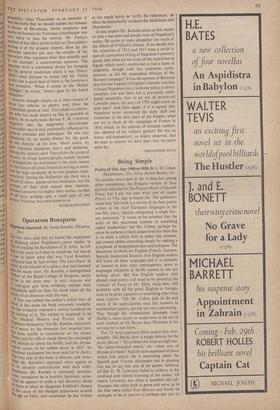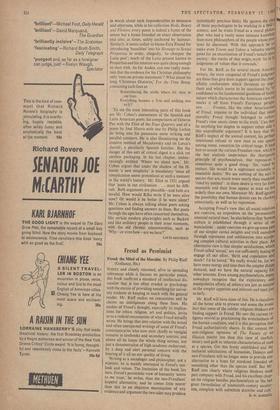Being Simple
Poetry of This Age: 1908 to 1958. By J. M. Cohen.
(Hutchinson, 25s.; Grey Arrow Books, 5s.) WE already owe a debt to Mr. Cohen for, among other translations, his Penguin version of Don Quixote and also for his Penguin Book of Spanish Verse, but I am not sure what sort of reader Poetry Of This Age is meant for. The publishers claim that 'this book is a survey of the best poetry written in the chief European languages in the last fifty years,' thereby composing 'a single liter- ary panorama.' It seems to be assumed that the unity of this panorama consists in something called 'modernism,' but Mr. Cohen, perhaps be- cause he eschews critical jargon (not but what this is, in itself, a relief), fails to define this element; you cannot define something simply by making a scrapbook of biographical data and synopses. The literatures involved are English, French, German, Spanish, Italian and Russian. Few English readers will know all these languages and it is certainly of interest to hear what contemporary poets in languages unknown or hardly known to one are writing about. But few English readers who already read poetry will need to be spoonfed the 'content' of Yeats or Mr. Eliot, while they will probably with all the poets, English or foreign, wish to be given signposts to something other than mere content. This Mr. Cohen fails to do and many of his appreciations read like answers to examination papers, pat but not very convincing : Poe, though his romanticism descends from 'Shelley's, came nearer to modernism in his use of such symbols as the Raven than Whitman in his striving for a new form.'
This '0' level-approach often makes him over- simplify. Did Hardy have 'a tough distaste for the poetic phrase'? 'My ardours for emprize nigh lost,' 'the moon-blanched sward,' etc.—what sort of phrases are these? And the same approach at times makes him unjust. He is interesting about the Spanish poet Vicente Aleixandre but in praising him has to say that one of his poems 'achieves all that D. H. Lawrence failed to achieve in his confused and violent hymning of the senses.' Of course Lawrence was often a muddled old tub- thumper, but often both in prose and verse, as in the free verse poem New Heaven and Earth, he manages to be as precise as perhaps one can be
in words about such imponderables as sameness and otherness, while in his collection Birds, Beasts and Flowers every poem is indeed a hymn of the senses but a hymn founded on exact observation and also, at times, safely anchored by humour. Similarly it seems unfair to blame Ezra Pound for introducing 'banalities' into his Homage to Sextus Propertius in order, allegedly, `to cheapen the Latin past'; much of the Latin present known to Propertius and his mistress was quite cheap enough to start with. As for Auden, can one really main- tain that the evidence for his Christian philosophy only 'rests on private statements"? What about his long 'Christmas Oratorio,' For the Time Being. containing such lines as Remembering the stable where for once in our lives Everything became a You and nothing was an It?
To me the most interesting parts of this book are Mr. Cohen's assessments of the Spanish and Latin American poets; his comparisons of Octavio Paz with the Eliot of the Four Quartets and of a poem by Jose Hierro with one by Philip Larkin do bring into his panorama some striking and parallel contours. He is also illuminating on the creative method of Mayakovsky and on Lorca's duende, a peculiarly Spanish familiar. But the danger of this sort of critical digest is a slick yet careless packaging. In his last chapter, embar- rassingly entitled 'Where we stand now,' Mr. Cohen argues that under the shadow of the H- bomb 'a new simplicity' is mandatory 'since all complication seems pretentious at such a moment in the world's history.' Mr. Eliot in 1921 argued that 'poets in our civilisation . . . must be diffi- cult.' Both arguments are plausible—and both are invalid. How would Rilke write if he were alive now? Or would it be better if he were silent? Mr. Cohen is always talking about poets asking questions and finding answers to them. But poets through the ages have often concerned themselves, like certain modern playwrights such as Beckett and like ordinary people in their inner moments, with the old chronic unanswerables, such as 'Why—or even how—are we here?'
LOUIS MACNEICE







































 Previous page
Previous page